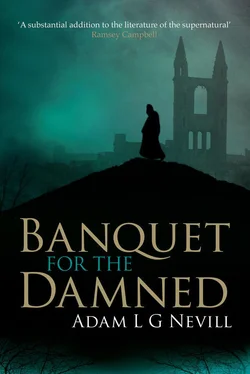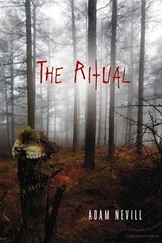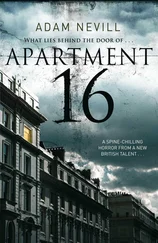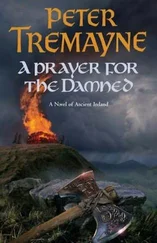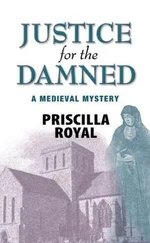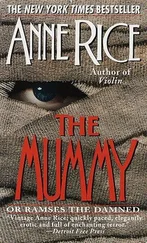'Uh-huh,' Hart says.
Rhodes places the two massive leather-bound volumes on the table before Hart, the smell of old books puffing around his face like dead pollen. 'Bit of light reading. Those winter nights must have flown by,' he mutters to himself. It will take days to read them both. He doesn't have the time. 'Was there a certain part in these that Eliot focused on? I appreciate you sorting them out, but I'm on a really tight schedule.'
Rhodes strolls around the room, unhurried, his hands clasped behind his back, while his face becomes a parody of an intellectual's delight in an opportunity to express his expertise. Hart smiles. 'Well, I suppose I can offer a brief outline of his initial study. Although it will be brief,' Rhodes says. His eyes are shining and seem bigger and not so sleepy anymore behind the lenses of his glasses. 'As I mentioned, I only assisted Eliot's secondary reading.' He wafts a hand about, distractedly. 'Assembled his bibliography and assisted with the footnotes. And those two volumes, both written in the late twenties, provide a fair summary of Eliot's original speculations. And yes, they'll take some reading. Rather heavy going from a historical perspective, like the Reverend Summers. But I liked working with Eliot, because his own travels gave him more precise insights than the authors of these two books, who I assume wrote in a cloistered environment without the benefits of fieldwork.'
'Amen to that. You don't have to convince an anthropologist. But why did Eliot come here, to St Andrews?'
'I can only suppose it was in the interest of continuing his work. I never thought he was a man interested in a conventional career. The lecturing, it's fair to speculate, would have been secondary to the further cultivation of his interests as an explorer. We have amassed one of the best occult collections in Britain here at the library. Most of it bequeathed, but all of immeasurable benefit to him. I believe he had friends here too, who secured a lecturing position for him. I think the scandal over Banquet for the Damned had subsided sufficiently to make him a safe bet, if you follow.'
Hart nods. 'Can you tell me anything about these books? You know, why he'd be so interested in them specifically?'
'I can certainly help with the Blackwood, who by the way wrote in a slightly antiquated style and it's heavy going. That of the gentleman dilettante, not unlike C W Ceram, but without the wit. Blackwood had time at his disposal to amass an extraordinary compendium of occult occurrences. He rants a little, we felt too, from a very orthodox Catholic standpoint. You know, convinced that Satan or some such nonsense was behind every evil in the world, but his historical material is really very, very good. Indispensable. The particular section that interested Eliot concerned the Hungarian society, or witch cult. Made particularly poignant by its dependence on the familiar.'
Hart frowns in concentration while Rhodes paces about the reading room, occasionally glancing across at him, as he continues with his recollections, flushing at times with a topic that obviously enthralled him in the past. 'It was the summary of the Kresnik inquisitors' findings, at a celebrated trial held in the northeastern region of Hungary in the late 1400s, that really excited Eliot. You'll find it in chapter five. I remember copying it for Eliot. Fascinating piece. You see, as the trial progressed, the witnesses began giving statements about the witches' exceptional powers for divining and summoning, following the use of strong hallucinogens prior to ritual. Ecstatic ritual. I daresay, you are aware of Eliot's own digressions with these substances, a long time before it became fashionable?'
Hart nods.
'Well, it was claimed that the nine accused had spread an epidemic of animal disease, tempests to ruin the crops, human illnesses and so forth. We can assume someone had to be blamed for natural consequences, as was the way of things at the time. But what enthralled Eliot was the evidence stating that the coven was served by, and indeed served, an emissary. An ancient spirit with something of an appetite for sacrifice. From that, allegedly, their power came.
'There is a passage in the Blackwood describing how the coven delighted in a rather gruesome practice of —' Rhodes pauses, his eyebrows rising over his glasses '— of dismembering their victims, and removing the skin or bones prior to a cannibalistic orgy. All rather distasteful. And their Sabbaths involved dreadful inversions of Christian services. You can feel the author holding back on specific details, and he loses his impartiality by vehemently condemning the accused and, would you believe, taking sides with the inquisitors.'
Hart moves around on his seat, uncomfortable and unable to feel the benefits of the radiator's warmth.
'But what is also extraordinary about this case is the leader. These weren't the usual unfortunate crones on trial here. No, the leader of the cult was a woman of noble birth. It was her influence that must have prolonged the coven's activities. Her name was Kazparek, I think. You see, it was some time before the church put an end to the activities of her coven. She'd had something of a field day until the ecclesiastical authorities were compelled to intercede. Forced to, because of the monstrous nature of her crimes.
'The head inquisitor, a fiend called Kolosvar, called Kazparek a "devil" and a "whore", amongst other things, at her trial. In fact, he didn't consider her to be human. Nor did he ever cease to be amazed at her resistance to torture. It was only when the astonishing beauty of her face was threatened with a hot poker that she cracked.
'And it was from her confession that so wide a range of diabolical crimes has been recorded. It's why I can remember the case so well. Her testimony, and it's all in the Blackwood, detailed the seizure and consumption of, I recall, some fifty infants and youths over a period of six years. Including her own son, would you believe.
'The other eight in the coven were burned alive in a mass pyre, but Anna Kazparek survived the flames. On account of her title. But she was banished from Hungary. I think her lands and wealth was confiscated too, but one can't help but think she got off lightly.'
Rhodes takes a breath and rocks back on his heels. Hart sits still, increasingly distressed at the thought of what Eliot has been meddling with. He wants a drink, and feels utterly humbled by Rhodes Hodgson's encyclopaedic knowledge.
'Blackwood, however, pursued her to Germany, where a similar group surfaced. This would have been fifty years later.' Rhodes begins to smile. 'Impossible, I know. But she allegedly recruited a new coven made up of rebellious nobles. And again they acted according to the will of their familiar. Their emissary.
'The coven was known as a Wahrwolf society. Something Blackwood attributes, like other scholars, to the Werewolf legend. This time their notoriety arose from their wearing of human skins, usually those of abducted youths, in the form of raiment. There was the same pattern of forbidden rite and unholy mass as in Hungary, preceding all manner of social ills again. Though this time they seem to have added to their dark talents. The Warhwolfs had mastered the ability, while in a trance, to provide a new mobility for their deity. It allowed the spirit to move at night and wreak a rather grisly fate upon a chosen victim.
'A bishop, I seem to recall, became their nemesis in Germany, and once more the coven was ruthlessly exterminated. The leaders too this time.
'Blackwood's story then leads to the 1500s, in Poland, and yet another emergence of a similar cult. In Poland they called them the Upyr , which Blackwood believes to have evolved into the vampire myths. The Upyr 's blasphemous and murderous activities were so widespread and of such a magnitude they were described as a plague.'
Читать дальше
